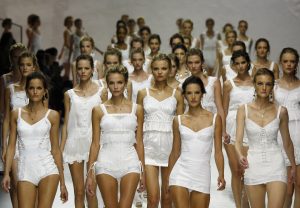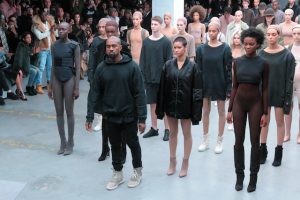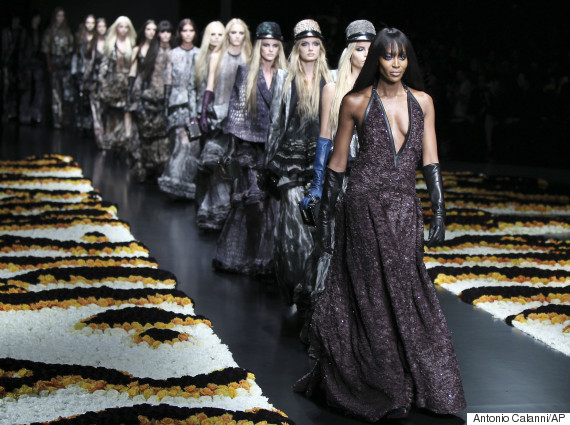Aesthetic ideals of designers and creatives in the fashion industry continue to reflect a racial bias against coloured skin models. The lack of diversity in the modelling world continues to a be of concern and a barrier for black females trying to succeed in their fashion career. Over the past 20 years, the industry has only evolved from zero on the runway to just under a quarter of multicultural ethnic background female models.

Dolce & Gabbana Spring-Summer 2011 fashion collection, Milan, Italy, Sunday, Sept. 26, 2010. (AP Photo/Antonio Calanni)
Championing models of white skin, not only on the catwalk, but also in magazine covers and campaigns is getting to influencers and models who are passionate about diversity and equality. “Having been to over 30 castings in the last six months”, Australian model Jessica Purchase confirms that these are “definitely fairer skin dominated”. With the likes of Bethann Hardison, Naomi Campbell, Leomie Anderson and Jourdan Dunn, social media platforms such as Instagram and Twitter have become a tool for them to express their expert opinion and voice, standing up for the fight against diversity in the fashion fabrication.
Had to ask her straight “do you have foundation for my skin tone orrrr?” My girl started sweating and said “I like to mix brands”
— Leomie Anderson (@Leomie_Anderson) February 17, 2016
After the Balenciaga show, 2016, outrage and uproar was spread among the industry, with the show having only one non-white model. Comme des Garçons, Moon Young Hee and Yunya Watanbe shared an equal mean of zero percent models of colour in their shows. The top four major fashion capitals leading some of the worlds biggest fashion shows in London, Paris, Milan and New York showed a white-washed runway in 2016. At the New York Fashion Week, only 24.75% of models were one of colour.
Frustrated by not seeing black women represented in fashion, Glenford Nuñez decided to aim his camera at a solution https://t.co/GVum7mY9oe pic.twitter.com/ecTY4ip6mh
— Skin+Pepper (@SkinandPepper) June 18, 2017
The ties between the fashion and beauty industry is strong. Women of colour are finding it more difficult to find a range of products and options they can use on their skin tones, in comparison to the endless amounts of choice that white-skinned models can choose from. Leomie Anderson tweeted “why can a white model confidentially sit in anyone’s chair and feel confident they’ll look okay but black models have to worry? We need more makeup artists and hair who are competent with all races backstage at shows.” In the 21st century, there are only about five well-known make-up brands that actually stock a wide variety of products to suit a darker skin customers needs, including Black Up, Charlotte Tilbury, Bobbi Brown, Iman and Cover FX. Emily Moore, a make-up artist at Napoleon Perdis discusses the hardships she faces at her job, when the brands they sell do not have enough ranges to include black women, don’t go to a dark enough shade, or lack colours effective for their skin tone. She thinks that “the range is not as big, or not as big as it should be for black women, especially when we live in such a multicultural country.” Moreover, make-up artists are not prepared to work with black models or on dark skin.
Jess Purchase Make Up Artisits by Hannah Clarke
Stream Jess Purchase Make Up Artisits by Hannah Clarke on desktop and mobile. Play over 265 million tracks for free on SoundCloud.
While these international fashion capitals of the world demonstrate the challenges black women face in the industry, Melbourne model for Precision Agency, Jessica Purchase believes Melbourne is a strong leader of diversity in the global sphere. She says Melbournians have embraced multiculturalism so “darker skin is a craze now.” Ajak Deng will be the face of Melbourne Spring Fashion Week of 2017 highlighting this evolvement of multiculturalism on the runway in Melbourne.
Melbourne fashion blogger of @whatwouldkarldo , Jessica Dempsey also believes Melbourne has a strong stand in diversity among the modelling industry in relation to the other big cities, “we see a whole lot of race on the runway” she said, specifically in the last five years, which lends hope for the future catwalks.
Jessica Dempsey Modelling Diversity by Hannah Clarke
Stream Jessica Dempsey Modelling Diversity by Hannah Clarke on desktop and mobile. Play over 265 million tracks for free on SoundCloud.
While skin colour “has been a barrier in the past, and it still is tricky for darker skin models to get there foot in the door” says Purchase. Debra Ojumu, founder of Skin + Pepper Model and Film based in Melbourne, is an international boutique agency that aims to focus on the concerns of diversity in modelling and acting, representing individuals from an African diaspora. Through the likes of such individuals, the hope for black models in the industry is not over to change the status quo.

Yeezy Collection, 2016. Season 3 had 100% of Models of Colour.
(AP/Photo: Ivan Nikolov/ WENN)


[…] Read the full article here: http://thecityjournal.net/news/featuresandexplainers/bleached-black-runway-continues-dominate/ […]